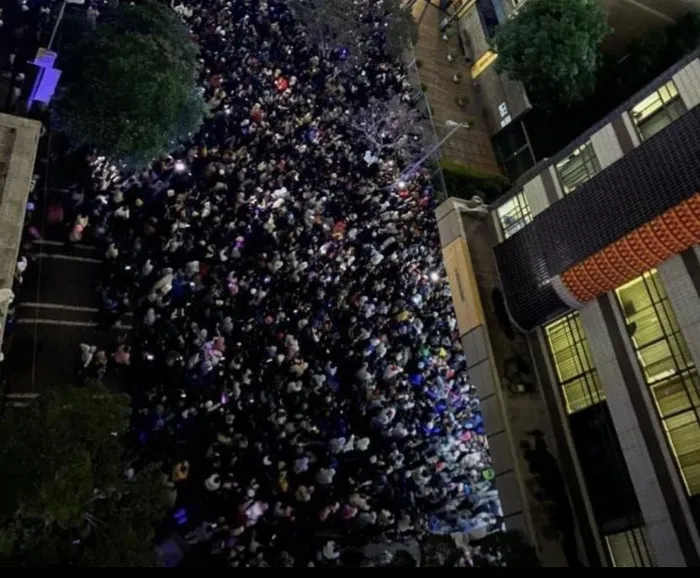Joburg women to unite for national GBV shutdown

Wits students held a protest against gender-based harm on Monday night at the institution’s Braamfontein campus after the alleged rape a female student.
Image: Facebook
Women in Johannesburg are joining a nationwide shutdown on November 21, demanding urgent action on gender-based violence and femicide (GBVF). The campaign, led by Women For Change, calls on women and members of the LGBTQI+ community to make their absence felt both socially and economically.
Tensions over gender-based violence erupted at Wits University this week after students learned that a Student Representative Council (SRC) member allegedly raped a fellow student over the weekend. Protesters demanded the immediate removal of the accused. On Thursday, the demonstration escalated at the busy intersection of Yale and Empire roads when a motorist allegedly fired live rounds into the air during a confrontation with the crowd, forcing students to scatter. Two were treated for minor injuries after falling. The university later placed the SRC member on precautionary suspension while the Gender Equity Office investigates the allegation.
By Friday morning, the national petition launched by Women For Change - calling for GBVF to be declared a national disaster - had surpassed one million signatures.
Beyond campuses, political leaders are under increasing scrutiny.
GOOD Party deputy security general Suzette Little said: “Each death is a life cut short -a daughter, mother, sister, friend gone forever. Yet we carry on as if this brutality is inevitable. Criminals roam freely, guns are everywhere, and fear dominates our communities. This is not nature; it is the result of a catastrophic failure of governance.”
Voices from the frontlines highlight the personal toll of government inaction.
Lucinda Evans, feminist activist and founder of Philisa Abafazi Bethu, said: “I joined the Call because daily I see the women in my emergency safehouse, whom we save along with their children, at the hands of a government who pays more for perpetrators in prison than women in emergency safehouses. My demands are that President Ramaphosa go and that the government should replace him with a woman so that our future as women would have a better prospect. ”
Other organisations are echoing these demands for urgent reform.
Ilitha Labantu spokesperson Siya Monakali said: “The national shutdown reflects the deep frustration and fatigue many feel towards a system that continues to fail women. Violence against women is a daily reality and demands sustained, year-round action. Weak implementation of laws, low conviction rates and lack of accountability perpetuate this crisis.”
Survivors stress that the shutdown is long overdue.
Seasoned publicist Bonnie Meslane, who is also a GBV survivor, said: “It’s absolutely necessary. I can personally name so many women I know who have experienced abuse, whether sexual, physical, emotional, or financial. This march is long overdue, and I want to commend the Women for Change warriors for leading this movement. My hope is that this time, the government truly listens and takes decisive action. We cannot remain silent any longer. I want to see stricter laws and harsher consequences. Courts need to stop granting bail to sex offenders and abusers. The law should not protect perpetrators under the guise of privacy or bureaucracy, like the POPI Act.”
Advocates insist meaningful change also depends on legislative reform and leadership accountability.
Embrace Dignity co-founder Nozizwe Madlala-Routledge said: “While our president has pronounced that we are faced with a pandemic, there is no evidence of an appropriate strategy, including allocation of resources or providing consistent and targeted leadership. The timing of the shutdown during the G20 drives home the extent of the frustration. The G20 theme: Solidarity, Equality, and Sustainability needs to be translated into meaningful action for change. Passing the Equality Model Law should be prioritised to effectively address the violence of the system of prostitution. The Equality Model would: Address the demand by keeping the buying of sexual acts criminalised and holding abusers (sex buyers, pimps, and brothel keepers) accountable. Decriminalise those selling sexual acts and provides support for exit and re-integration into society.”
Despite some progress, structural gaps continue to endanger women and children.
Sindisiwe Msimango, Mpumalanga Representative for the National Shelter Movement of South Africa (NSMSA), said: “Gender-based violence... is a lived reality for women and children. We are witnessing a persistence of deep-rooted patriarchy, socio-economic inequalities, and systemic failures that continue to make survivors unsafe. There have been pockets of progress, for example, the strengthening of the legal framework through the GBV Amendment Acts, the establishment of the NSP on GBVF, and the expansion of Thuthuzela Care Centres. However, implementation remains inconsistent. Survivors still face secondary victimisation at police stations, delayed justice, and a lack of trauma-informed support.”